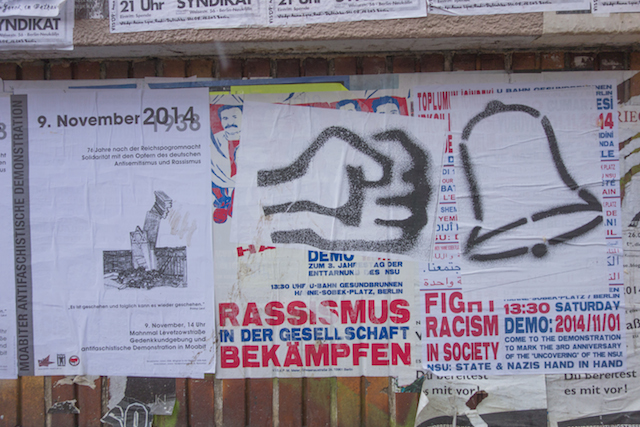Germany’s fractured twentieth-century history gives racism a different meaning there than it has in the United States, Great Britain or France. The lack of an unbroken colonial legacy and the immigration to which it inevitably leads made people of African and East Asian descent relatively uncommon. Those who did settle down came primarily as guest workers or asylum seekers. And the Holocaust further complicated matters.
While the concept of race is itself problematic, given the fact that it runs counter to our modern understanding of genetics, it is typically applied in cases where a population differs significantly in physical appearance from either the majority or the group which is politically dominant. It also tends to carry extra weight in situations where the marked population has a good deal in common with the other inhabitants of that nation: language, culture, or religion.
In Germany, the former criterion is clearly met in some cases — former East Germans of Vietnamese descent, refugees from Sub-Saharan Africa — but more ambiguously in others. Because the Nazis’ genocidal program against Europe’s Jewish population continues to shape both perceptions of what it means to be German, anti-racist campaigns invoke it in order to bolster their rhetoric. But if it was already difficult to single out Jews when Hitler’s minions were running the show, doing so today is even more difficult. The country’s small but growing Jewish population looks a lot more “German” than its other minorities, both in terms of physical appearance and attire. More importantly, it acts more “German”, from the perspective of those who deem it possible to bind nationality to behaviour.
From the standpoint of religion, Muslims make up by far the biggest minority in contemporary Germany and one a great deal larger, proportionally, than the Jewish population was when the Nazis came to power. But the nation’s Muslims are a diverse lot, sometimes united only by the antipathy directed their way. The Turks who came as guest workers in the 1950s and 1960s are now senior citizens, most of whom would find their ancestral homeland more foreign than their adopted one. The Syrians who have come as asylum seekers in the past few years, by constrast, may not have had the opportunity to learn much about Germany or its language at all. Yet both groups include people who could “pass” for German from a purely physical standpoint and many others whose otherness only draws attention to itself after close scrutiny.

When the opponents of right-wing populist movement like PEGIDA conceive of their project as an anti-racist one, then, they are thinking less about the color of a people’s skin or the shape of their eyes than something more abstract: a quality of “Germanness” that is conceived of in racial terms. However well intentioned, this effort therefore relies on an older concept of race than the one that prevails in the contemporary world, the one which Adolph Hitler deployed in Mein Kampf when he ranted about the “lesser races”. That’s what makes using racism as a rallying point so problematic.
Are the activists who organize against racism opposed to the concept itself? Or do they implicitly reinforce the notion that anyone who isn’t traditionally German belongs to a different race? This distinction matters more than it should because of the Basic Law that has functioned as the Federal Republic’s de facto constitution since its creation and was extended to the former East Germany after reunification. It’s a progressive document, in some ways, declaring that men and women are legally equal and insisting that the possession of property comes with social obligations. But the rights it enshrines are only extended by default to those people classified as Germans.
If this category included everyone who lives in Germany for a sufficient period of time and does what it takes to become a citizen, it would be easier to fashion an equitable multicultural society. But Article 116 of the Basic Law instead defines “Germans” as those who already possess citizenship — leaving the pathway to attain it unspecified — those who possessed it prior to the Nazi regime but were deprived of it during that period, and those who were exiled from Germany or — and this is the catch — had ancestors who can claim the status of exile, provided that they can establish that they are of “German ethnic origin”. Given how far-flung the German diaspora was before it became a unified nation, stretching far into what is now Russia, this last group could potentially include people whose ancestors hadn’t set foot on German soil for centuries. At the same time, these specifications do not make accommodations for people not of German ethnic origin, no matter how long they or their ancestors may have lived there.
Although it would probably be unfair to characterize the architects of the Basic Law as “racists” in the older sense, the effect is the same as if they had been. Indeed, one could argue that it theoretically excludes Jews and Slavs, as Hitler would have wanted, as well as more recent migrants to German soil. That’s why advocates for a more inclusive, diverse Germany have to be so careful about how they characterize their purpose. Unless the Basic Law is substantially revised or replaced with a formal constitution like the one which the Weimar Republic had, making it clear that Germanness is not inherited, but earned by a series of steps open to everyone living in Germany, regardless of their ethnic origin, religion or other distinguishing traits, then any social or political gains of a progressive nature will be provisional at best.
Photographs courtesy of Joel Schalit.





